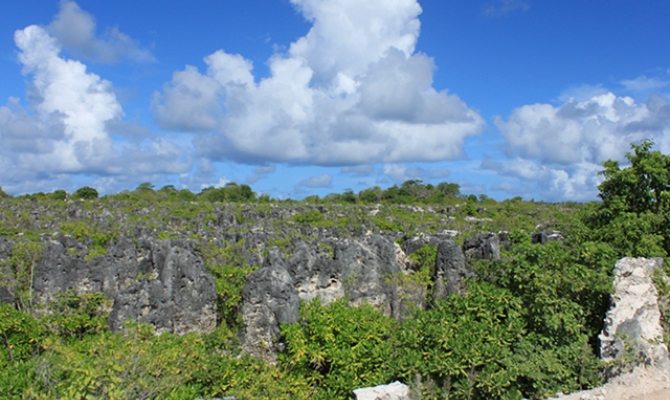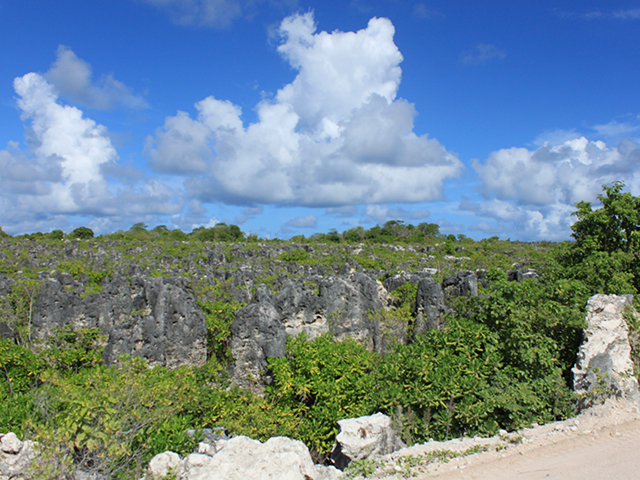
Climate Change Resilience
A new Letter of Agreement has been signed between the Secretariat of the Pacific Regional Environment Programme (SPREP) and the Republic of Nauru to support urgently needed climate change adaptation activities in the country.
The formal Agreement will see SPREP provide capacity development and technical advisory support to Nauru to develop concepts and project proposals for submission to the Adaptation Fund Board.
In November 2013, SPREP was accredited as a Regional Implementing Entity (RIE) under the Kyoto Protocol Adaptation Fund of the United Nations Framework Convention for Climate Change (UNFCCC). This milestone accreditation has made SPREP one of only three such RIEs in the world.

Mr Aaron Cook, Minister of Commerce, Industry and Environment (CIE) was instrumental in ensuring the signing of this Agreement, in which Nauru has now become the third country to officially engage with SPREP in its capacity as RIE.
Nauru's Secretary of the Department of Commerce, Industry and Environment, Mr Elkoga Gadabu, stressed the importance of the agreement:
"The Pacific Adaptation to Climate Change (PACC) project in Nauru has already resulted in new ideas and innovative technologies being trialed and installed to better equip our people against climate impacts and threats. With this important project drawing to a close in March this year, we feel a strong sense of urgency to upscale this vital work. I'm very pleased to be signing this Agreement which will see Nauru benefit from the expertise and support of SPREP to apply for funding for this crucial work to continue."
At the signing on 27 January this year, SPREP's Director General, Mr David Sheppard, said that it was proactive of Nauru to plan ahead and seeking security for funds for adaptation work on the ground:
"While the PACC projects in Nauru have shown promising results, this Letter of Agreement is a critical first step in formalising our commitment to partner with Nauru and working together to fast track concepts and proposals to advance work on the ground and ensure submission to the Adaptation Fund Board on time."
Some of the most urgent and immediate activities which will be developed for funding submission will centre around improving water and food security and responding to accelerated sea level rise. Given the country's contaminated groundwater source, the adaptation initiatives will address improvements in conjunctive water use throughout the country and promote the use of saltwater to alleviate water shortages and improve water quality.
The formal Agreement will see SPREP provide capacity development and technical advisory support to Nauru to develop concepts and project proposals for submission to the Adaptation Fund Board.
In November 2013, SPREP was accredited as a Regional Implementing Entity (RIE) under the Kyoto Protocol Adaptation Fund of the United Nations Framework Convention for Climate Change (UNFCCC). This milestone accreditation has made SPREP one of only three such RIEs in the world.

Mr Aaron Cook, Minister of Commerce, Industry and Environment (CIE) was instrumental in ensuring the signing of this Agreement, in which Nauru has now become the third country to officially engage with SPREP in its capacity as RIE.
Nauru's Secretary of the Department of Commerce, Industry and Environment, Mr Elkoga Gadabu, stressed the importance of the agreement:
"The Pacific Adaptation to Climate Change (PACC) project in Nauru has already resulted in new ideas and innovative technologies being trialed and installed to better equip our people against climate impacts and threats. With this important project drawing to a close in March this year, we feel a strong sense of urgency to upscale this vital work. I'm very pleased to be signing this Agreement which will see Nauru benefit from the expertise and support of SPREP to apply for funding for this crucial work to continue."
At the signing on 27 January this year, SPREP's Director General, Mr David Sheppard, said that it was proactive of Nauru to plan ahead and seeking security for funds for adaptation work on the ground:
"While the PACC projects in Nauru have shown promising results, this Letter of Agreement is a critical first step in formalising our commitment to partner with Nauru and working together to fast track concepts and proposals to advance work on the ground and ensure submission to the Adaptation Fund Board on time."
Some of the most urgent and immediate activities which will be developed for funding submission will centre around improving water and food security and responding to accelerated sea level rise. Given the country's contaminated groundwater source, the adaptation initiatives will address improvements in conjunctive water use throughout the country and promote the use of saltwater to alleviate water shortages and improve water quality.